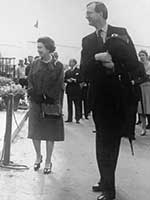|
Robin Herbert CBE
Late Royal Horse Guards
by Captain Ross Murray DL
formerly Queen’s Own Highlanders

|
Robin Herbert, who died at his home in Llanbedr, Powys on 12th January 2024, served as a National Service officer in the Royal Horse Guards (1952-1954), also his father’s regiment, and his enthusiasm and support for the Blues remained a constant all his life. He enlisted with Nicholas Assheton (late LG) into Sergeant Rowley’s Brigade Squad at the Guards Depot straight from Eton in November 1952. He formed enduring friendships with fellow Guardsmen such as Crispin Tickell and Mark Fitzalan-Howard. The Squad Commander, Captain The Hon Eddie Digby, became in due course a close friend and fellow gardening enthusiast.
His Army service was mostly based at Caterham Barracks with the Blues, with welcome glamour acting as an usher at HM Queen Elizabeth’s coronation on 2nd June 1953. 6’ 7” was a commanding height for a cornet in the Household Cavalry, less so for sitting in the turret of a Ferret armoured scout car. From a formative two years’ National Service with The Blues, Robin went up to Christ Church, Oxford, where he read PPE, and then to Harvard where he took an MBA. It was a stellar education that prepared him well for an amazingly varied career. Firstly, as an analyst for a Wall Street broker in New York; analysis was a training he put to good use throughout his life. He then qualified as a land agent to better understand the advice he received as owner of not one but three inherited estates in South Wales.
Then, when life in the country became insufficiently challenging, Herbert joined a consortium of investors in a small merchant bank in London, Leopold Joseph. His career as a financier had begun, with promotion to Chairman in 1978 before steering the business to a sale to the Bank of Butterfield in 2004. Throughout his City career Robin was sought after for his advice, with many non-executive directorships, notably Marks & Spencer, NatWest Bank, and Consolidated Goldfields.
Alongside his City time he maintained the restoration of the family estates in Monmouthshire, returning at weekends to his home at Llanover. Farm investment, cottage restoration, woodland creation on scale, and planting up his beloved garden all featured. He found time to be a JP in the Abergavenny Courts, as well as High Sheriff and Deputy Lieutenant. Public and charitable service included both the National Trust and Countryside Commission, and then as Chairman of the Royal Botanic Gardens, Kew. With Dame Jennifer Jenkins he reformed the Royal Parks.
It is in the field of horticulture that Robin will be best remembered. His father, Sir John Herbert GCIE, formerly MP for Monmouthshire, had died in Calcutta (now Kolkata) in 1943 as Governor of Bengal. His mother, Lady Mary Herbert, died four years later. An orphan at 13 he was influenced to garden by his Godfather, the plantsman Bobby Jenkinson. From a later trip to California during his time at Harvard he returned to Wales with a suitcase of redwood seed. Today’s legacy is a prize winning two acre stand of Sequoia Sempervirens over 150 feet tall. As his own garden developed, so did his wider horticultural interests. Tours around the world with the International Dendrological Society widened his botanical interest and plant collection at home. He also acted as Trustee for the Arnold Arboretum in Boston, USA.
Robin was notably elected President and Chair of the Royal Horticultural Society in 1984. His 10-year energetic tenure saw a restoration of fortunes, a refocus of show activities beyond the Home Counties, and acquisition of Rosemoor in Devon and Hyde Hall in Essex. Membership more than doubled, finances were restored, gala dinners at Chelsea Flower Show added glitz and funds, and judging of plants was central to the RHS’s integrity with gardeners.
Robin Herbert always maintained that National Service was one of his most formative educational experiences, that contributed to his many later successes. ‘On time is late’ was a mantra impressed on his family, guests and colleagues. No doubt Sergeant Rowley would have taught him that.
|
|

